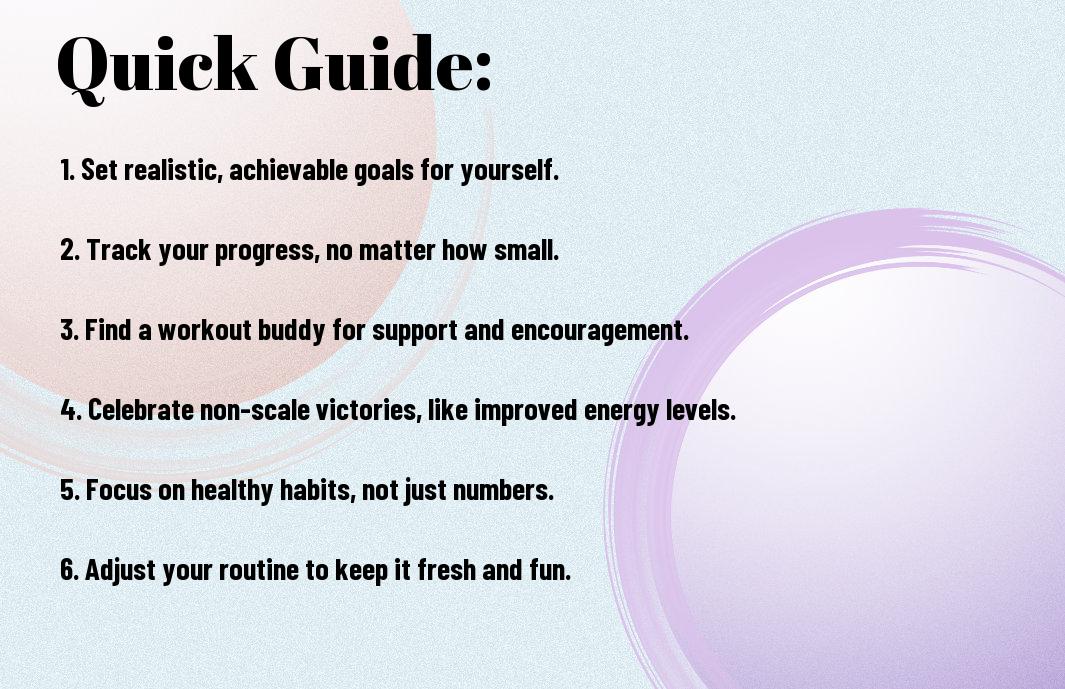This guide offers practical strategies to help you maintain your motivation during challenging weight loss journeys. You may encounter moments when the scale doesn’t budge or when cravings seem overwhelming, making the path feel daunting. In these times, it’s important to shift your mindset and incorporate actionable steps that focus on progress rather than perfection. By understanding your motivations and setting realistic goals, you can find renewed energy and commitment to your weight loss journey, allowing you to thrive even when it feels tough.
Key Takeaways:
- Set realistic goals: Break down your weight loss journey into manageable milestones to maintain motivation and celebrate small victories.
- Track progress: Keep a journal or use an app to log food intake and workouts, helping you stay accountable and visualize your achievements.
- Stay flexible: Adapt your approach as needed; if something isn’t working, be open to trying new strategies or adjusting your routine.
- Seek support: Connect with friends, family, or weight loss groups for encouragement and to share experiences, creating a sense of community.
- Focus on health: Shift your mindset from solely losing weight to improving overall well-being, which can help sustain long-term motivation.

Understanding Motivation
A strong understanding of motivation is crucial for achieving your weight loss goals. It encompasses both intrinsic and extrinsic factors that influence your drive to pursue change. By recognizing what motivates you, you can better harness that energy to overcome obstacles. (Identifying your core motivators can significantly enhance your weight loss journey.)
Types of Motivation
Types of motivation can be categorized into two main types: intrinsic, which comes from within you, and extrinsic, driven by external rewards. Understanding these types helps you tailor your approach to stay consistent and engaged. (Choosing your motivation style is key to maintaining progress.)
- Intrinsic Motivation: Personal satisfaction and fulfillment
- Extrinsic Motivation: Rewards like praise or social recognition
- Goal-Oriented Motivation: Focused on achieving specific targets
- Emotional Motivation: Driven by feelings and emotions
- The combination of these factors can provide a well-rounded motivational strategy.
| Type of Motivation | Description |
| Intrinsic | Motivation originating from personal satisfaction. |
| Extrinsic | Motivation driven by external rewards or recognition. |
| Goal-Oriented | Motivation aimed at achieving specific outcomes. |
| Emotional | Motivation influenced by your feelings and emotional state. |
| Dynamic | Creating a balance between different types of motivation. |
Factors That Influence Motivation
An array of factors can sway your motivation levels, including your mindset, environment, and support system. A positive mindset and surroundings that reinforce your goals will keep your motivation thriving. (Choosing a supportive environment can greatly enhance your success.)
- Your mindset about weight loss and health
- The presence of a supportive community
- The accessibility of resources and tools
- Accountability measures, such as friends or coaches
- Assume that each factor plays a significant role in your motivation levels.
Factors that influence motivation can vary greatly from person to person. You should assess which aspects of your life potentially hinder or promote your desire to lose weight. (Evaluating your environment is crucial to understanding your success rates.)
- Understanding the importance of mindset
- Analyzing your external environment
- Engaging with your support network
- Setting realistic and achievable goals
- Assume that acknowledging these factors can lead to better strategies for your motivational journey.
For instance, changing your daily routine to include physical activities you enjoy can significantly increase your intrinsic motivation. Finding enjoyable exercises can help combat negative feelings towards weight loss. (Making your fitness enjoyable is crucial for sustaining motivation.)
Tips for Sustaining Motivation
There’s a variety of strategies you can adopt to keep your motivation strong throughout your weight loss journey. Consider implementing these tips:
- Track your progress and celebrate small victories.
- Establish a routine that incorporates both exercise and healthy eating.
- Engage in activities you enjoy to make fitness fun.
- Surround yourself with people who encourage you.
After applying these strategies, you’ll notice a renewed sense of purpose in your weight loss efforts.
Setting Realistic Goals
There’s a need to establish goals that align with your personal abilities and lifestyle. Instead of aiming for drastic changes, focus on achievable milestones that can gradually lead to significant results. This mindset not only makes your journey feel manageable but also boosts your confidence as you progress.
Creating a Supportive Environment
Little changes in your surroundings can greatly impact your motivation levels. Surround yourself with supportive individuals who share your goals and can hold you accountable. (Joining a weight loss group or finding a workout buddy can help reinforce this support system.) Make your living space conducive to healthy habits, from stocking nutritious foods to setting up a dedicated workout area.
Setting boundaries around any unhealthy influences is vital when creating this supportive environment. This could mean limiting time spent with individuals who discourage your healthy choices or avoiding situations that lead to poor eating habits. (Ultimately, fine-tuning your environment can enhance your focus on long-term success.)
Your Step-by-Step Strategies to Boost Motivation
Your journey towards weight loss can be more manageable with effective strategies in place. Below is a table to guide you in boosting your motivation and staying on track:
| Strategy | Description |
|---|---|
| Set Realistic Goals | Aim for small, attainable milestones to celebrate progress and build confidence. |
| Find a Support System | Surround yourself with encouraging friends or join a community with similar goals. |
| Change Your Environment | Create a space that promotes healthy habits, free from temptation. |
Developing a Sustainable Plan
Step by step, create a plan that fits your lifestyle and preferences. Focus on incorporating nutritious foods and enjoyable physical activities into your routine. The key is consistency; aim for gradual changes rather than extreme diets. This way, you can foster long-term habits that keep you motivated to continue your journey.
Tracking Progress Effectively
Tracking your progress helps maintain focus and encourages you to persist (deciding how often to track is imperative). To do this, consider keeping a journal or using a fitness app to log your meals and workouts, which provides tangible evidence of your efforts and achievements.
Developing effective tracking methods not only captures your weight loss journey but also identifies areas for improvement. Opt for regular check-ins, weekly weigh-ins, or measurement tracking to gauge your progress. This way, you can adjust your strategies as needed, ensuring continued momentum and motivation (automating reminders to track can be helpful).
Pros and Cons of Various Weight Loss Approaches
All weight loss approaches come with their sets of advantages and disadvantages. Understanding these can help you find a method that suits your lifestyle and goals. Below is a breakdown of popular strategies:
| Approach | Pros and Cons |
|---|---|
| Keto Diet | Fast initial weight loss / Nutrient deficiencies if not balanced |
| Intermittent Fasting | Simple to follow / May lead to binge eating |
| Paleo Diet | Focuses on whole foods / Can be expensive |
| Low-Carb Diets | Easier weight loss for some / Can be hard to maintain |
| Plant-Based Diet | Rich in nutrients / Requires careful planning |
| Weight Watchers | Supportive community / May not fit all lifestyles |
| Meal Replacement Shakes | Convenient / May lack necessary nutrients |
| Commercial Diet Programs | Guided structure / May become expensive over time |
| Counting Calories | Flexible / Can become obsessive |
| Mindful Eating | Improves relationship with food / Requires patience |
Popular Diets and Their Impact
One of the most important decisions you can make when initiateing on your weight loss journey is choosing the right diet. Popular diets, such as the Keto or Mediterranean diets, can have varying impacts on weight loss and your overall health, depending on how well they align with your body’s needs and your personal preferences.
Exercise Regimens: Benefits and Drawbacks
On the other hand, exercise regimens are a vital component of any weight loss strategy. While regular physical activity boosts metabolism and helps burn calories, certain exercise routines may not be sustainable long-term for everyone. Understanding both the benefits and challenges can empower you to stick with a routine that works for you.
Regimens focusing on strength training can increase muscle mass, which boosts your resting metabolism, while cardio sessions are excellent for burning calories quickly. However, excessive exercise without proper recovery can lead to burnout or injury. Striking a balance that includes a mix of discipline and flexibility is key to achieving your weight loss goals effectively.

Overcoming Mental Barriers
Many people face mental barriers that can hinder their weight loss journey. These barriers often manifest as negative self-talk, fear of failure, or past experiences that create doubt. Acknowledging these thoughts is the first step towards overcoming them. By challenging your negative beliefs and replacing them with positive affirmations, you can shift your mindset and create a more supportive environment for your goals.
Dealing with Setbacks
Assuming setbacks are part of the journey, it’s crucial to approach them with a constructive mindset. Instead of viewing a setback as a failure, treat it as an opportunity to learn and adjust your plan. (Choosing to assess what went wrong without harsh self-judgment can lead to better strategies moving forward.)
Cultivating a Positive Mindset
Assuming you’re actively working on maintaining a positive mindset can significantly impact your weight loss progress. By focusing on your achievements, however small, you can build momentum and reinforce your commitment. (Deciding to engage in daily affirmations or gratitude practices can help shift your perspective.)
To cultivate a positive mindset, it’s crucial to surround yourself with supportive people and to engage in activities that inspire you. Incorporating mindfulness techniques can also help you stay grounded and focused on your goals. (Making a commitment to practice self-compassion can empower you to embrace your journey more fully.)
Building a Long-Term Motivation Plan
Unlike quick fixes, a long-term motivation plan lays a solid foundation for sustained weight loss success. Establishing clear goals and an actionable daily routine can keep you focused and inspired over time. Identify what drives you personally—whether it’s health, appearance, or activity levels—and integrate these motivations into your everyday life. Consistency is key; by incorporating small, enjoyable changes, you can create lasting habits that support your weight loss journey.
Maintaining Momentum
One effective way to maintain momentum is by setting up small, achievable milestones that lead to your larger goals. (Decide on increments that you can celebrate to keep your spirits high.) This approach allows you to experience frequent feelings of accomplishment, which can significantly boost your motivation. Engage in supportive communities, whether in person or online, to share your progress and encourage others, as this connection can propel you forward even when challenges arise.
Adapting to Life Changes
Clearly, adapting to life changes while pursuing your weight loss goals demands flexibility and resilience. (Decide to embrace changes rather than resist them; this mindset will help you thrive.) Life events can disrupt routines, but reviewing and adjusting your plan can help you stay on track. Understand that adjustments don’t signal failure; they’re an opportunity to reevaluate and reinforce your commitment to personal growth.
This recognition can empower you to cultivate new habits that fit your evolving lifestyle. Whether it’s a new job, family obligations, or health shifts, find ways to integrate fitness and healthy eating into your day. Acknowledge these challenges, and rather than letting them derail your progress, view them as a chance to innovate and recommit to your goals. (Your willingness to adapt will be a significant factor in your long-term success.)
Conclusion
Ultimately, maintaining motivation during your weight loss journey may feel daunting at times, but by setting realistic goals, celebrating small victories, and seeking support, you can transform your mindset. Focus on progress rather than perfection, and allow yourself grace as you navigate this path. Keep reminding yourself of your reasons for launching on this journey, and visualize your success. By staying connected to your purpose and adjusting your approach when needed, you can overcome obstacles and achieve lasting change in your life.
Q: How can I set realistic weight loss goals to maintain motivation?
A: Setting realistic weight loss goals is important for keeping up your motivation. Start by breaking down your larger weight loss target into smaller, more achievable milestones. For instance, if your goal is to lose 30 pounds, aim for losing 1-2 pounds per week, which is a sustainable and healthy rate. Document your progress and celebrate small victories, whether it’s fitting into a pair of jeans or completing a week of workouts. This approach helps keep your motivation alive as you see tangible results along the way.
Q: What strategies can I use to stay motivated on challenging days?
A: On particularly challenging days, it’s important to have a toolkit of strategies ready to help you stay motivated. Consider keeping a journal to write down your thoughts, feelings, and accomplishments. Additionally, having a go-to playlist of uplifting songs can help boost your spirits. Surrounding yourself with supportive friends, joining a workout group, or seeking online communities can also provide encouragement. Lastly, remind yourself why you started this journey; reconnecting with your ‘why’ can reignite your passion for achieving your goals.
Q: How do I overcome weight loss plateaus while staying motivated?
A: Weight loss plateaus can be frustrating, but they are a common part of the journey. To overcome them and maintain your motivation, consider varying your exercise routine by trying new activities, such as cycling or dancing, which can help shock your body into further weight loss. Additionally, assess your dietary choices and ensure you’re consuming a balanced diet that meets your energy needs. Incorporating strength training can also boost your metabolism. Lastly, remind yourself that plateaus are just temporary phases, and focusing on your overall health rather than just the numbers on the scale can help you remain positive and engaged in your journey.










Reply